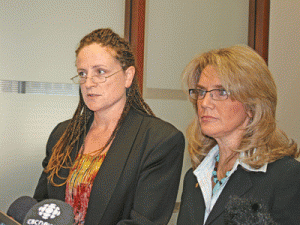A local group designed to help immigrant women in Halifax has not received government funding since 2009, after its current executive director was accused of mismanaging money from a federal grant the group received in 2008.

Five years after Rosamond Luke was accused of mismanaging a $142,700 grant from the Status of Women in Canada and a $38,000 grant from the IWK community grants program, the All Women’s Empowerment and Development Association is still working quietly in Halifax. Brenda Saunders-Todd, the former chair of AWEDA, was surprised to learn that the group was still active.
“I am unaware of it (AWEDA) continuing operation, and… can’t imagine who would be providing support?,” said Saunders-Todd in an email.
Looking for money
Not only is the group still running, but Luke is still its executive director, lobbying for funding from government groups to help fund programs within AWEDA to help immigrant women in need gain employment training.
On Aug. 22, 2013, AWEDA renewed its status as a lobbying group for another six months. The group has been registered with the Office of the Commissioner of Lobbyists of Canada since June 25, 2009.
Saunders-Todd was involved with AWEDA in 2008, and her surprise stems from the knowledge that she was one of two people who saw the group close in 2008.
On May 3, 2008 the All Women’s Empowerment and Development Association (AWEDA) was given a $142,700 grant from the Status of Women in Canada. Six months later, problems with AWEDA became public after its executive director, Rosamond Luke, was suspended for not being open about her past history, including charges against her in 2006 for uttering threats. A few days after Luke was suspended, Brenda Saunders-Todd, now former AWEDA Board Chair, discovered that most of the group’s money was gone.

According to Saunders-Todd, the group closed shortly after she and Dr. Patricia Glazebrook, another former board member, discovered that, after taxes, the group had only $2,300 left.
AWEDA closes
Shortly after Saunders-Todd and Patricia Glazebrook, a former AWEDA director, suspended Luke they began to look at the group’s money and spending records. According to court records, after the two went to Credit Union Atlantic to look into AWEDA’s spending and money owed was paid to Revenue Canada, the group did not have enough money to continue, so Saunders-Todd and Glazebrook made a decision to close the organizations doors.
According to court documents, some of the group’s cheques had been made out to cash and others were paid to Luke.
Luke refused to comment, but in an email she denied the accusations against her. “I am doing great and I am blessed and if those accusations were accurate I wont (sic) be here today,” she said.
Because the group closed, the Registry of Joint Stock companies shows that they defaulted for non-payment on Dec. 4, 2008. The group was re-activated the next day, Dec. 5, 2008.
Two days after the group closed, Dec. 6, 2008, it was active and holding its Annual General meeting. Neither Saunders-Todd nor Glazebrook were present. At the meeting, Luke was re-instated as executive director by a newly appointed board of directors. This action, according to Saunders-Todd, was not legal.
According to the Societies Act, any change in a group’s board of directors must be filed within 14 days of any changes. At the time, no change had been filed when Luke was re-instated. The change of directors was filed Dec. 10, 2008.
Government audit
On January 14, 2009, Saunders-Todd received a letter from the Status of Women in Canada that it was looking into performing an audit on the groups use of the grant money. Luke also received a similar letter.
According to Saunders-Todd, Status of Women determined that the audit would cost too much, and “they would not be able to recover the funds.” Status of Women was not able to comment in time for publication.
Court Cases
In a small claims court case, Luke made claims against Saunders-Todd, Glazebrook and Grant Machum, asking that AWEDA property be returned and claiming for personal items that Luke also claimed had been taken. The first hearing for the case was on February 17, 2009.
On February 18, 2009, the day after the small claims court case was first heard, Luke was accused of stealing from the Nova Scotia Liquor Corporation (NSLC). According to court records, Luke was charged with possession of stolen property on Oct. 28, 2010.
The small claims court judge dismissed the two claims and Luke was ordered to pay Machum for the costs of the case, $848.79.
Despite the initial ruling, Luke tried to appeal the case on October 10, 2009. She claimed that the judge, Judge Walter Thompson, was biased, because he had a connection to Credit Union Atlantic, the bank where AWEDA had its account. Peter Bellworthy, the Credit Union vice president, was a witness in the first court case, and Luke claimed bias because the Judge Thompson and Bellworthy knew each other, and so Thompson had personal interest in the matter.
Luke also tried to appeal for bias, because Thompson said that AWEDA was not a corporation, but, according to the earlier court document, AWEDA was not a corporation, because the guidelines and bylaws of the group were not being followed in September 2008.
The Supreme Court judge dismissed Luke’s appeal, and no other court cases were filed.
Raising concerns
Saunders-Todd is not the only one who questions the group’s status. Colin MacDonald, a former volunteer fundraiser and former patron of the group also did not know the group was still active.
MacDonald was involved with AWEDA when it was in the planning stages. He donated money and encouraged others to as well. Looking back, he regrets his actions.
When the group first began in 2005, it was funded by donations from patrons like Colin MacDonald, a former fundraiser and patron of the group, who was involved with AWEDA during its planning stages.
He distanced himself from the group after he began to disagree with how the group was using money. “There was some things I didn’t agree with which entailed spending money on issues that I just found very difficult to believe that they needed; expensive office space, etc.,” said MacDonald.
MacDonald offers this caution when it comes to AWEDA, “I was stupid enough to give funding to the group to begin with,” he said. He did all he could for AWEDA, before he walked away from the group.
Leading a group
Saunders-Todd is no longer in contact with Luke or AWEDA, but she currently works with Dress for Success Halifax, a community group that helps women in need find clothes for job interviews and tools to help them get jobs. For her, it’s important to know who is leading a charity.
“I think it’s extremely important to know ‘who’ is leading or running these groups,” she said in an email.
